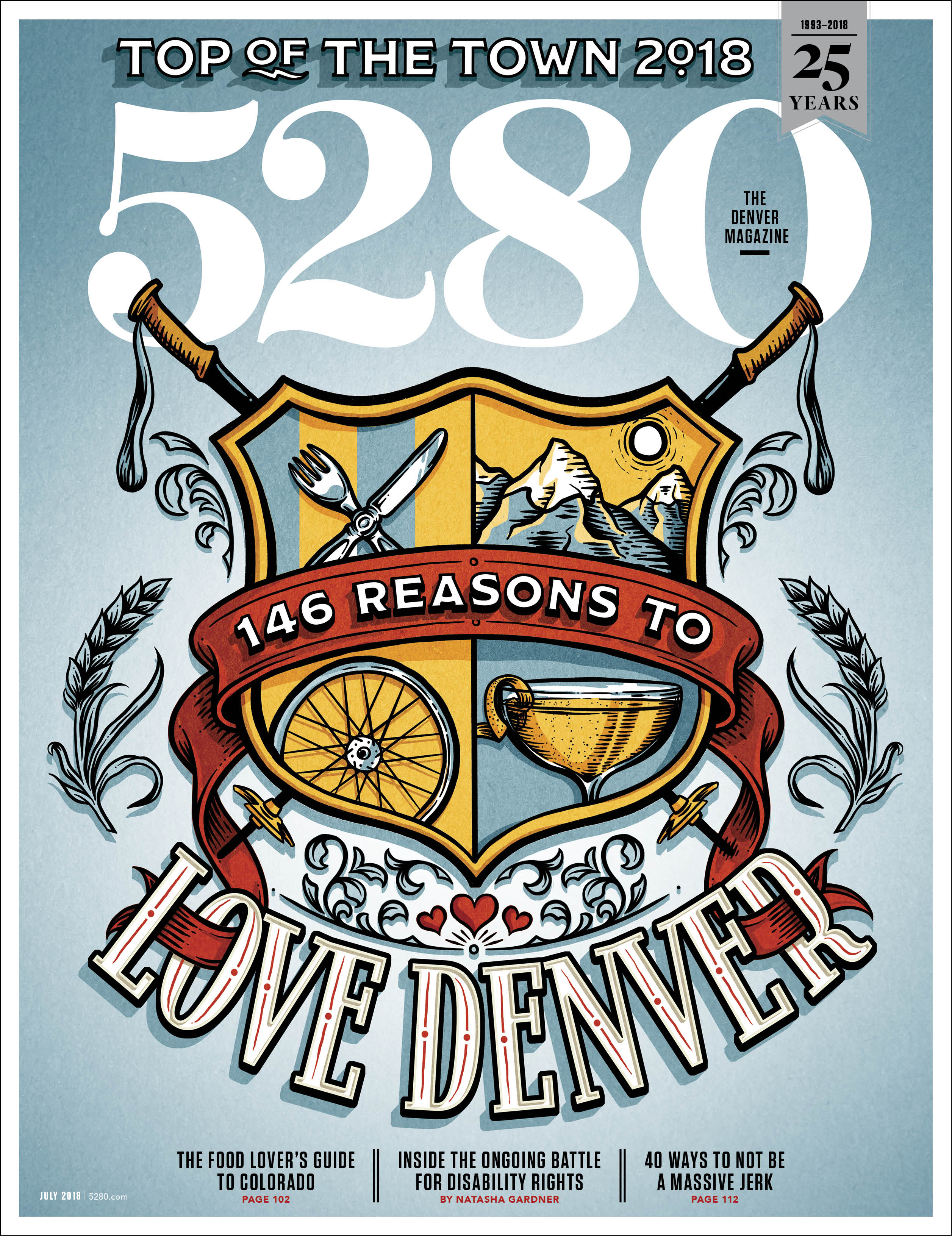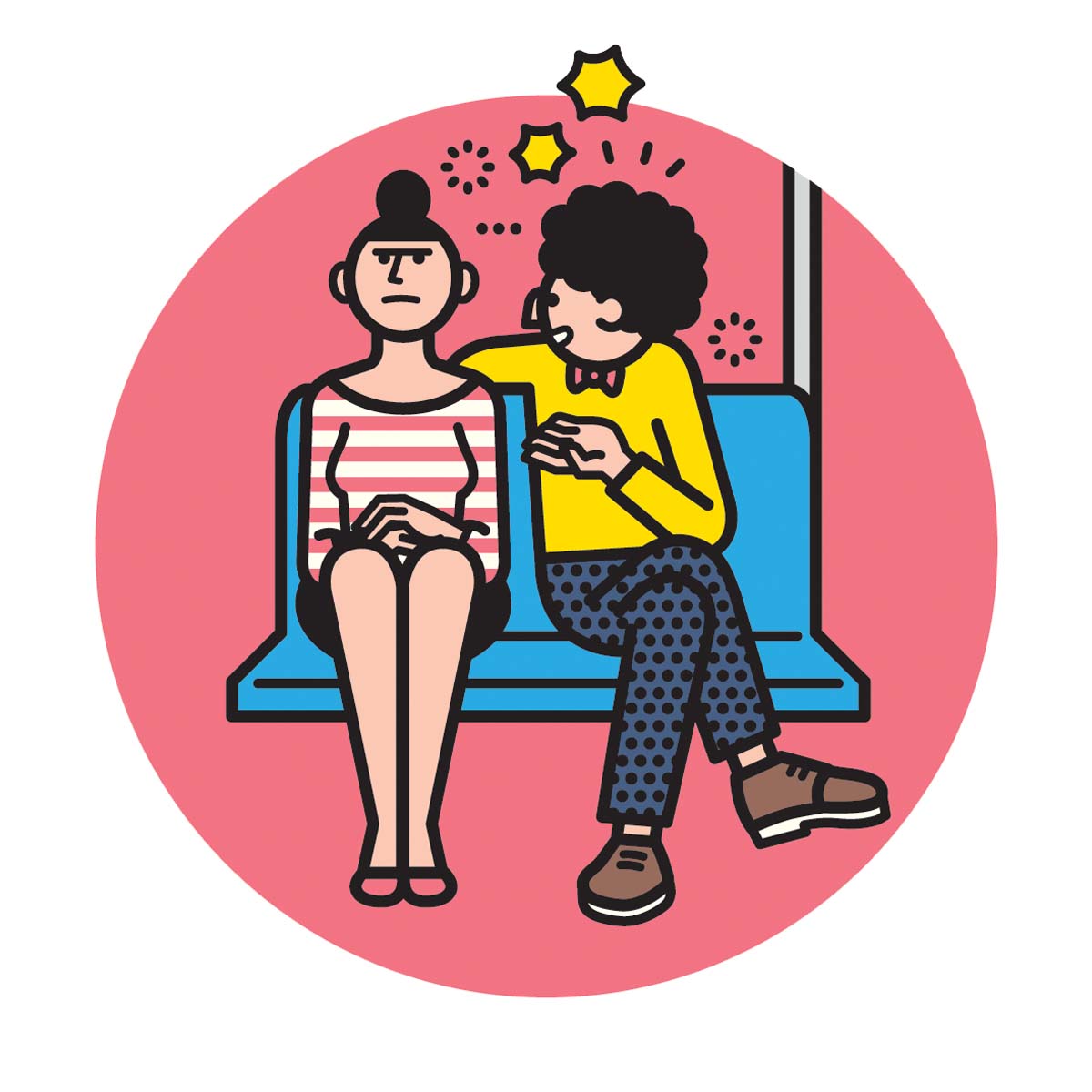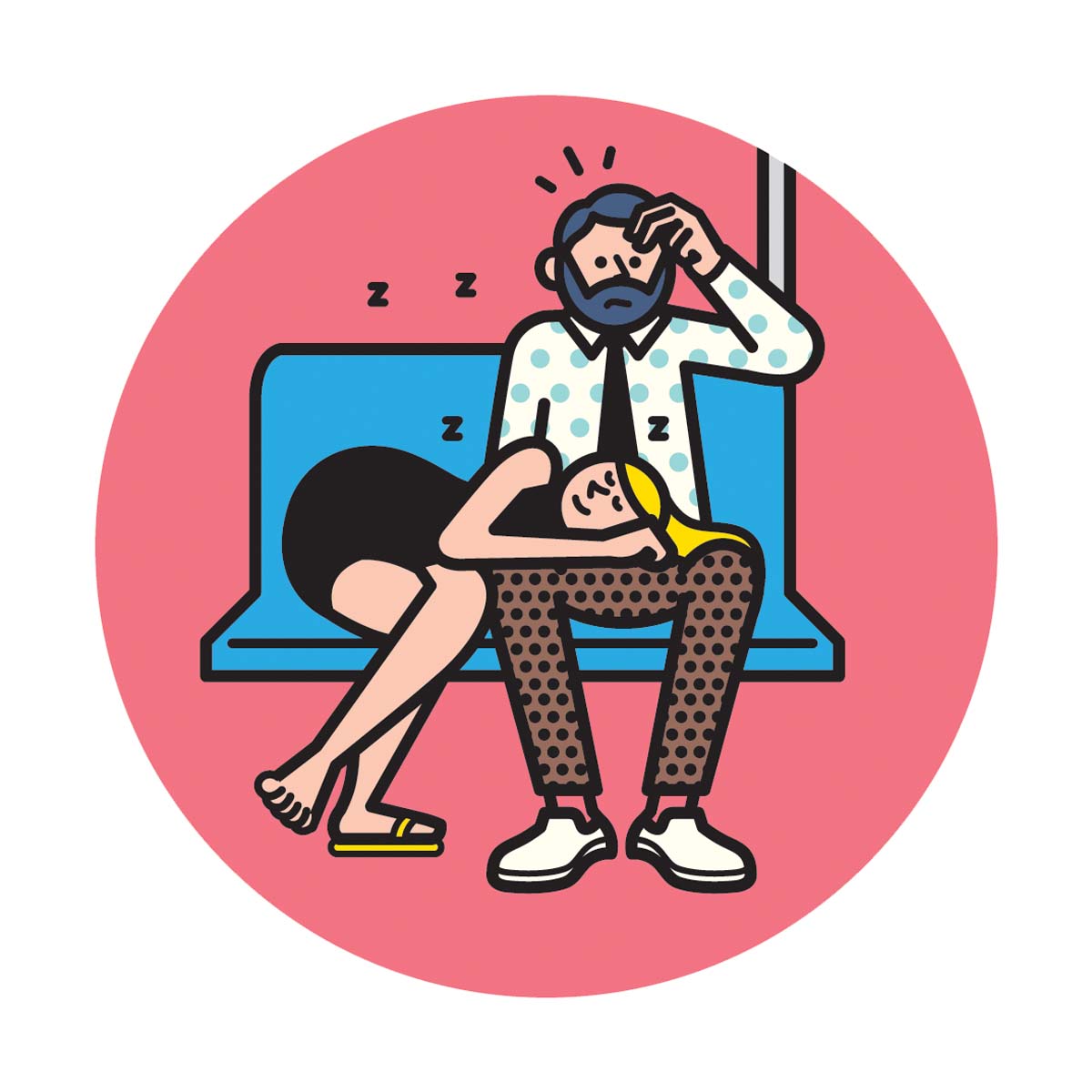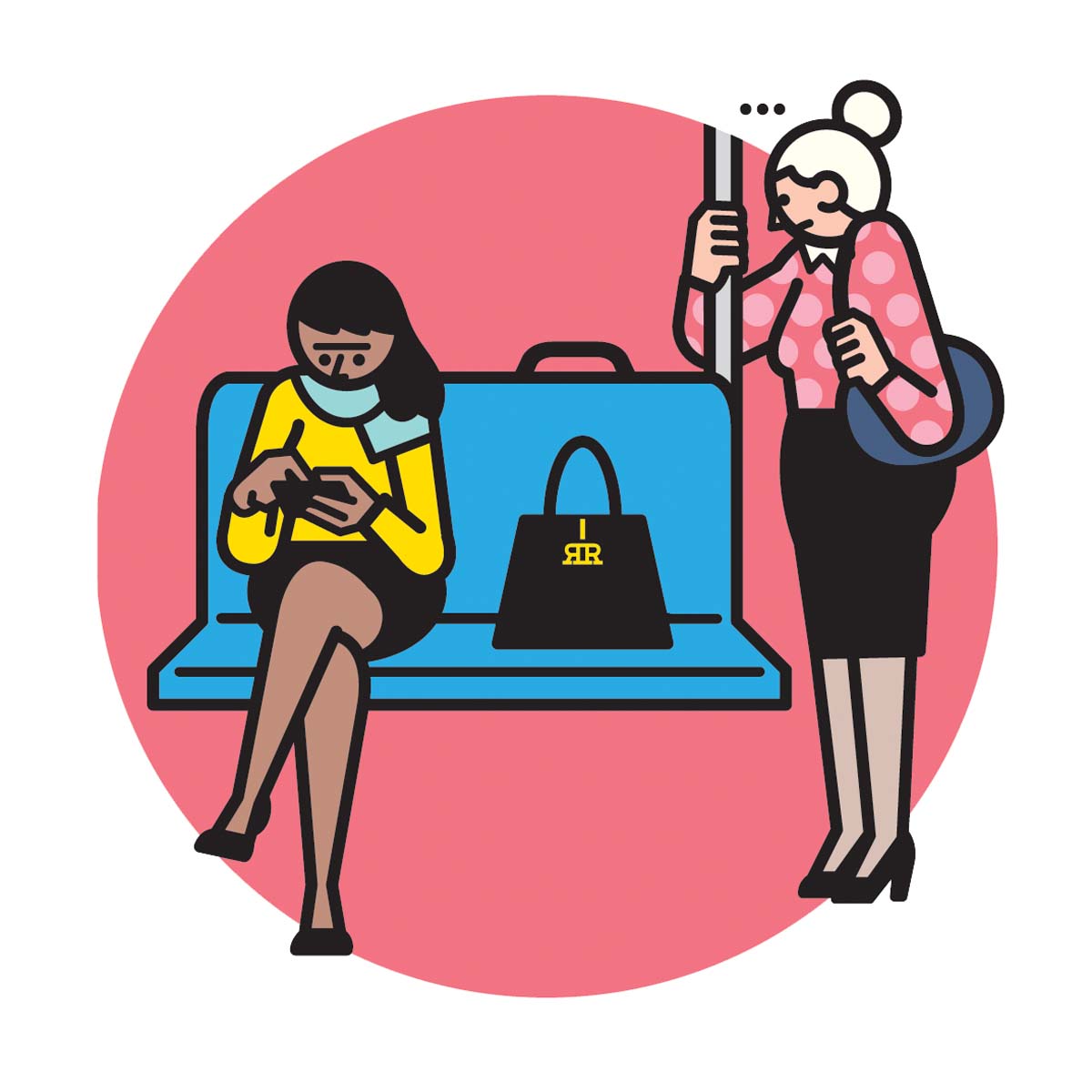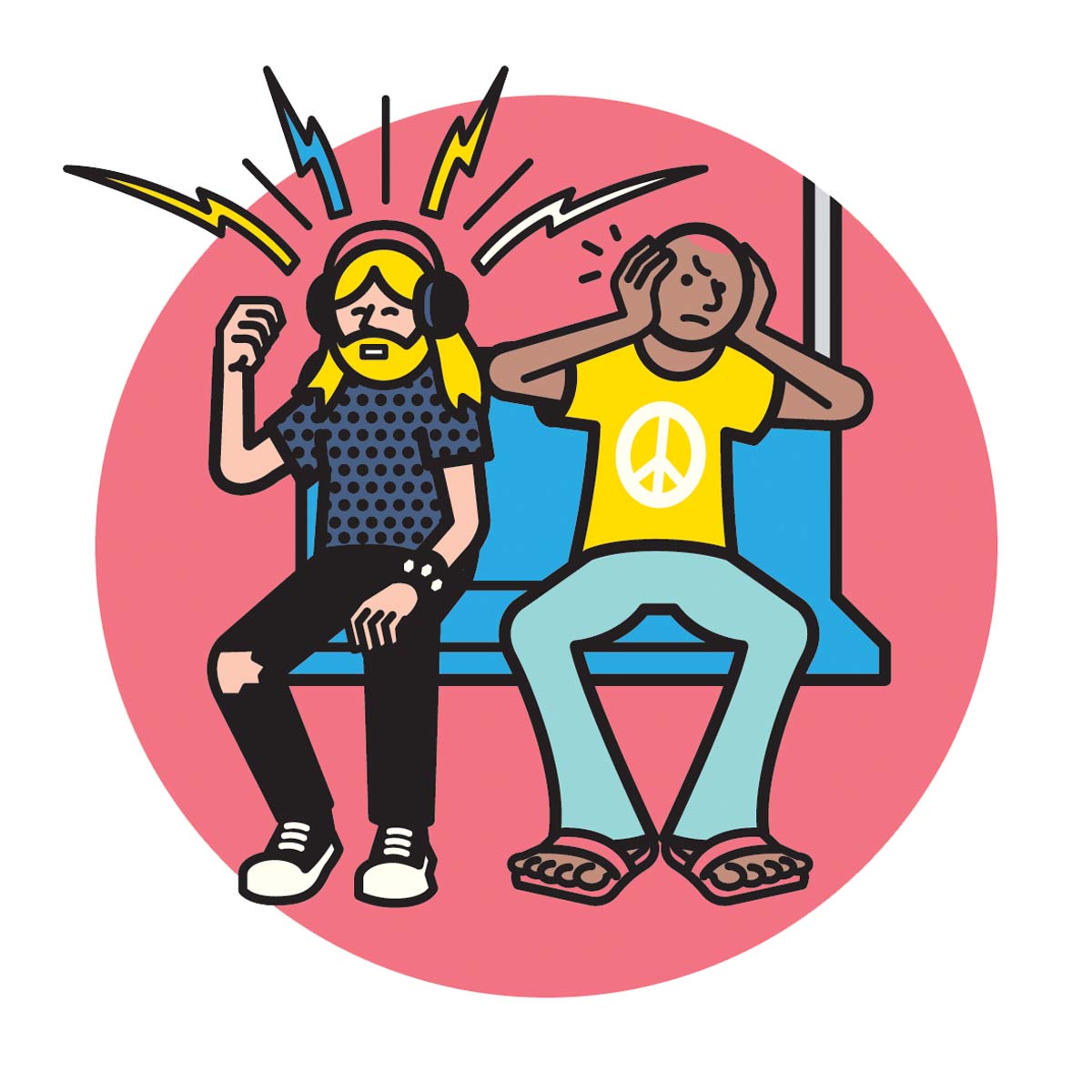The Local newsletter is your free, daily guide to life in Colorado. For locals, by locals.

Can’t We All Just Get Along?
Adding thousands of new residents—all of whom have varying ideas about how to behave—might seem like a recipe for urban chaos. It doesn’t have to be.
It should come as no surprise that America’s seminal tome about manners—Emily Post’s Etiquette in Society, in Business, in Politics, and at Home—was published at the height of industrialization in 1922. A period of great change, the early 20th century saw people from different regions and diverse backgrounds move in droves to cities. “When they came together in these urban areas,” says Daniel Post Senning, Emily’s great-great-grandson and spokesperson for the Emily Post Institute, “they had to figure out how to reconcile some of their differences. That’s where etiquette came in.”
In many ways, Denver is experiencing a similar urban expansion today. Denver County absorbed 17 percent of the state’s 65,000 new residents between July 2016 and July 2017 and is on track to do the same this year. The influx of so many people can mean roads and restaurants—and even our hiking trails—are getting more crowded. Plus, the tens of thousands of souls streaming into the Mile High City come from regions where manners and habits can vary wildly: Californians top the list of transplants, followed by Texans; a few notches down you’ll find New Yorkers. Talk about cultural differences. Given the complex mélange of humanity now inhabiting our state, it’s easy to understand why Coloradans, new and old, sometimes lose their cool with one another.
That’s where we come in. After surveying everyone from citizens to service-industry staffers to local business owners to CDOT executives, we created this handbook for how to behave in modern Colorado—be it on the highway, in a LoHi bar, or in the backcountry. Consider these general guidelines. After all, etiquette isn’t about following some inflexible set of arbitrary rules. (Seriously, no one really cares which fork you use at dinner.) It’s about civility and respect. Emily Post said “manners are a sensitive awareness of the feelings of others.” Your grandmother probably called it obeying the golden rule. We have a slightly less…well…polite way of putting it: Just don’t be a dick.
Need A Lyft?
As parking has become more scarce (and more expensive), Lyft has boomed in Denver. But if you ask someone else to brave the roads for you and said person is not a complete dillhole, at least do him a solid with a high rating—plus a few extra dollars. That’s something people in these neighborhoods already do: According to Lyft data,* they are Denver’s five most generous zip codes.
1. 80202. Includes: LoDo (Union Station and Larimer Square), Central Business District (the Colorado Convention Center)
2. 80249. Includes: Green Valley Ranch (DIA)
3. 80205. Includes: Five Points (Coors Field and RiNo), Whittier, Clayton, Skyland
4. 80203. Includes: Capitol Hill, Uptown, Speer
5. 80204. Includes: Lincoln Park, West Colfax, Sun Valley (the Broncos’ stadium), Villa Park, Auraria (the Pepsi Center and the Auraria Campus)
Food Court Follies
One family’s Saturday night hipster misadventure.
One of my favorite additions to Denver’s thriving dining scene is the market hall—Avanti Food & Beverage, the Denver Central Market, Zeppelin Station, and the like. I say that not just as an enthusiastic eater who likes variety, but also as a parent. After all, high-end food courts should be the perfect place to take a family: They’ve got choices that can satisfy everyone; they’re vibrant and fun; and they’re so noisy no one will notice if your two-year-old throws a hissy fit. There’s just one catch. When these places get busy, as they often seem to these days, sometimes the toddlers aren’t the only ones acting like ill-behaved children.
My wife, Stefania, and I got a taste of this distasteful side of Denver’s culinary culture one evening this past winter. We were tired, and we didn’t want to order pizza—again. So, I suggested Avanti. “It’ll be fun!” I said.
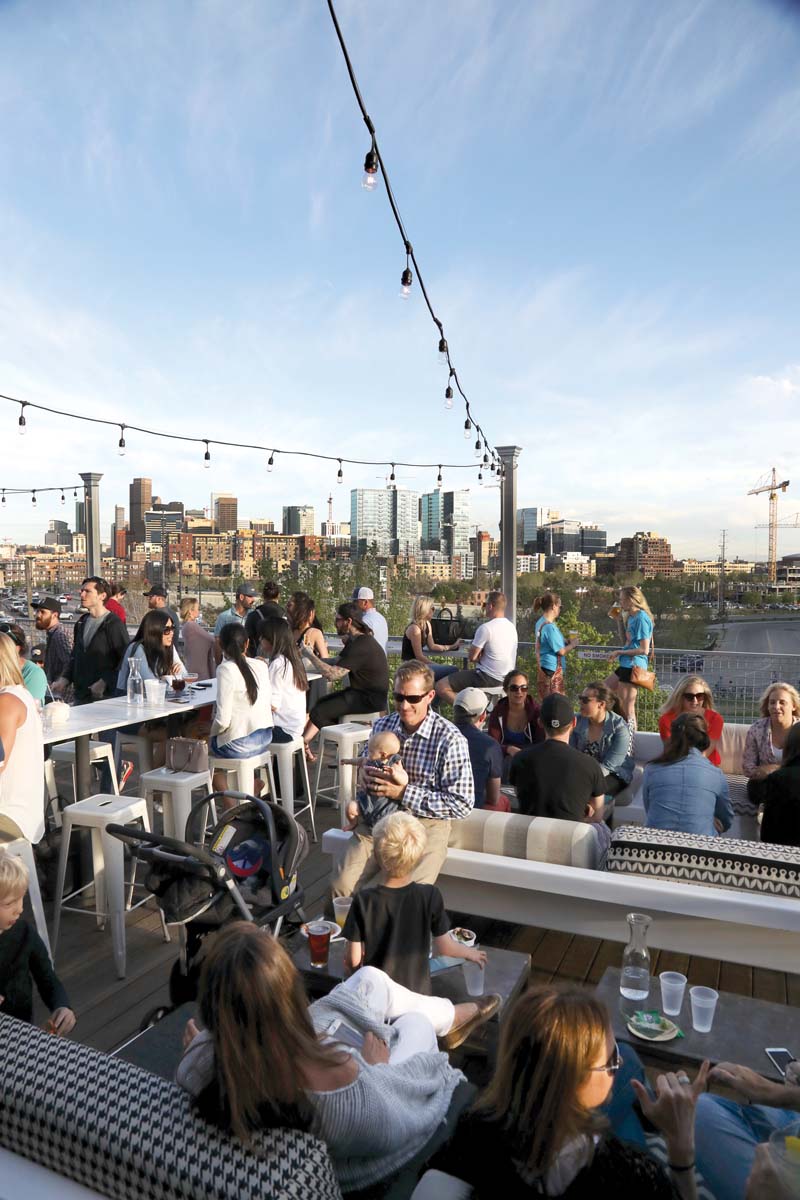
Boy, was I wrong. Perhaps it wasn’t the best idea to bring a family of four to one of the trendiest spots in Denver on a Saturday night. But neither is turning table selection into a contact sport: People were throwing elbows and delivering hip checks while lunging toward open seats. Determined not to engage in the violence-is-the-answer model in front of our kids, we split up. Despite hovering discreetly near parties that looked to be finishing their meals, it still took us nearly 40 minutes to get seats—and only then after Stef stood her ground when another group tried to take over the table she’d rightfully claimed. The adults gave my wife—and eight-year-old son—nasty looks and stomped off.
Our hardships weren’t Avanti’s fault, but the combination of buzzy-ness, scarcity of seating, and rude, entitled crowds can turn these places into the seventh circle of hell for families. In the same way parents should be considerate of other diners if their kids implode at a nice four-top (I’ve been on both sides of this one), it shouldn’t take a Ph.D. in politeness for adults to know to grab an IPA and chill out while waiting for seats when people are clearly queued up for them. Denverites might have a little maturing to do in that area. And because of that, the next time we’re tired and hungry we’ll stick with cold beer and pizza in a saner place: home. —Geoff Van Dyke
Dining Out Decorum
A few years ago, you could walk into your favorite LoDo restaurant without a reservation. Those days are gone—as is the ability to easily get a drink at the bar. Yes, eating out in Denver can be frustrating, so we asked the pros how to be a conscientious diner.
- Call ahead. Restaurants have to pay a fee for every reservation made through OpenTable. So book your seats the old-fashioned way: Pick up the phone. Trust us, the human interaction will do your email-saturated soul some good.
- Eye contact is enough. Whether you’re waiting for the host, looking to order a drink, or trying to get your server’s attention, eye contact is typically all you need to make the staff aware. Snapping, waggling a finger, or waving a hand—or, in a totally Jersey Shore move, brandishing money—is entirely unnecessary.
- Save space, save the place. The trend toward cozier venues has taken hold in Denver’s dining scene (e.g., Dead Battery Club, Call, and Ultreia), but that means a restaurant’s margins are based on fewer seats—a tricky proposition given our city’s exploding commercial rents. Be mindful of your favorite watering hole’s bottom line when picking your place at the bar: If three seats in a row are free, take one on an end so the couple that comes in after you doesn’t leave in search of a place with open stools next to each other. And ladies, your handbag does not need its own seat, even if it answers to the name “Gucci.” That’s what those hooks under the bar are for.
- To split or not to split. With today’s technology, your server can likely split a check with a few swipes on a touch screen—so it’s OK to ask for that courtesy. The polite move, though, especially if your party is larger than four, is to tell your server at the start of the meal and be clear about who’s paying for appetizers.

Trail Boss
How to share the great outdoors like a grown-up.
Colorado’s roads and real estate market aren’t the only things getting squeezed by our new residents. The state’s trails are feeling a little tighter, too. That overuse can damage recreational paths and impair adventurers’ abilities to enjoy them. And it can leave recreationists—like the angry trail runner who attacked a mountain biker and threw his wheels off a cliff in Golden last year—jostling, sometimes aggressively, for their fair share of dirt. Don’t be that guy. Although regulations vary depending on what entity (county, state, federal, or private owner) manages the land, these general guidelines should help you avoid adding assault charges to your alfresco outing.
1. Giving Way
Something that is “more dominating” should yield to anything “less dominating,” according to the U.S. Forest Service. That means motorized vehicles yield to everyone, and bikes yield to anyone on foot. The one exception? Horses. Because they spook easily, everyone gives way to these supersized scaredy-cats. All else being equal, downhill users should yield to those coming uphill.
2. For The Dogs
In Denver, dogs must be leashed except in dog parks, but on Boulder trails, if Spot wears his county-issued voice and sight control tag, he can go largely untethered. Still, even on trails where dogs needn’t be leashed, your pup should obey. Canines running wild can frighten others or provoke wildlife encounters. That’s especially true in national parks, where Fido is forbidden in most places.
3. All Ears (Or Ear)
It’s not illegal to use headphones on U.S. Forest Service trails, but at least attempt to employ that gray matter your helmet is protecting. Depending on the volume, headphones may inhibit you from hearing someone or something approaching, so consider keeping at least one ear unplugged. After all, once upon a time people went into the woods to actually listen to the call of the wild.
4. Trailblazing
Nearly every trail in Colorado is designed to mitigate impacts on our wildlands. Cutting switchbacks, creating pirate trails, and widening established paths—especially in forested areas where vegetation is vulnerable—destroys the wilderness and disrespects the many land stewardship organizations and volunteers who maintain them.
5. No-Fly Zone
Unmanned Aircraft Systems are prohibited from flying in national parks and wilderness areas. In other places you must follow Federal Aviation Administration regulations (e.g., register your drone and fly at or below 400 feet). You should also know when you’re being annoying: Some people might be looking to escape the tyranny of technology for a few damned minutes. —Jay Bouchard
Out Of Tune
Camping at one of the Centennial State’s more than 100 multiday musical fun-fests has become a quintessential Colorado experience. Here’s why I won’t do it again.
There’s a reason people with certain dispositions should not camp at music festivals. That reason has little to do with the late, noisy nights and stiff joints and more to do with a fear of felons—specifically, the fear of becoming one.
It almost happened to me this past summer at Lyons’ lauded Rocky Mountain Folks Festival. Organized by the same people who present the Telluride Bluegrass Festival and RockyGrass, the Folks Festival operates on a first-come, first-served system for campsites. My husband, Dave, and I arrived on Thursday afternoon, set up our tent, and—since there were no shows that evening—headed home to get a good night’s sleep. When we returned the next morning, our tent was still there, but in the intervening hours, some late-arriving festivarians had quite literally staked their Keltys over the top of our tent. Our once-cozy little camp looked more like tenement housing. As Dave left to secure our concert seats for the day, I angrily picked up a claw hammer to rip up our stakes and scooch our tent away from our impudent new neighbors. Dave eyed me nervously. “You’re only going to use that for the tent, right?” he asked.

Dark humor aside, the behavior seemed wildly out of whack with the festival’s be-kind, be-mindful theme. Since its inception in 1990, Lyons’ Folks Festival has gained a reputation for being one of the country’s greenest music fests. Planet Bluegrass, where the three-day event unfolds, contracts with vendors who use biodegradable plates and cutlery; provides reusable drink cups and recycles them; and even purchases carbon credits. Given that the festival draws 4,000 attendees, this is an admirable amount of do-goodery. It’d be nice if some patrons extended the same kindness to their fellow festivalgoers as well.
Part of the issue—beyond the fact that too much craft beer and weed often makes people less polite—might be that camping has become more popular, forcing organizers to expand from one campground to three in recent years. And some of the parties who have been attending for years pack a pile of entitlement with their sleeping pads and “Namaste”-emblazoned pillows. The sense that they’re being crowded out of their music fest can create an environment that fosters campground coups d’état. It also diminishes what the Folks Festival is supposed to be about: camaraderie, community, and, of course, quality entertainment.
We still found plenty of all that on the actual concert grounds, but my biggest chuckle came when I returned to our campsite Saturday evening. I discovered one of our graceless neighbors had been barricaded out of his tent by some new, ruder campers. When I arrived, he was surveying the scene. He looked up at me, pointed to the other tent, and said indignantly, “Can you believe some people?” I just smiled. Yes. Yes, I can. —Kasey Cordell

Snow Patrol
About 13 million people took to Colorado’s slopes during the 2016-’17 season—and none of them needed a license. That can turn first chair into amateur hour, so we’re here to help you keep it classy on the hill.
- Newbs: When you buy a ski pass, you’re agreeing to honor the National Ski Areas Association’s Responsibility Code. Among the highlights: Stay in control and be able to avoid objects (yes, people count as objects); skiers and boarders ahead of you have the right of way; don’t stop in the middle of a run or where you’re not visible from above; and look uphill and yield when trails merge.
Veterans: Don’t bro. The ways by which to bro are too numerous for this space, but they include bombing through beginner terrain and loudly spraying anyone within earshot about the gnar pow you just shredded up top. - Newbs: Just because you’re sporting janky rentals doesn’t mean the person in front of you is. Maintain enough control in the lift line to keep your sticks (or stick) off the pricey Icelantics in front of you.
Veterans: Even if your kid is the next Mikaela Shiffrin, it’s your responsibility to make sure your Gore Tex–wrapped bundle of joy isn’t scuffing the back of my newly waxed board. - Newbs: Try not to make erratic turns on a run. We’re all for random lines and patterns…in abstract art. But even Jackson Pollock started by coloring between the lines. Keep your turns as consistent and predictable as possible.
Veterans: Be a good Samaritan when someone yard sales; collect gear strewn uphill from the fallen. He’s got his hands full trying to find his pride.
RTD, Illustrated
A visual guide to riding public transportation like a civilized person.
Denver’s Regional Transportation District (RTD) has been operating since 1974, but the organization only adopted an official Code of Conduct at the end of 2016. The reason, according to RTD assistant general manager of communications Scott Reed, was an increasing number of “opportunities to enforce appropriate behaviors.” That’s a polite way of saying an increasing number of riders were acting like buffoons. In case you’re unfamiliar with RTD’s six-page rulebook and its 53 prohibited behaviors—among them, bringing a shopping cart and/or swords on the bus, pooping on public transportation, and (related) exposing your private parts—we offer you this abbreviated version.
Come Together
You can help prevent traffic delays—which are piling up in the Mile High City—by learning how to merge correctly (and without an attitude).
If you are one of those drivers who sees a “merge ahead” sign, quickly gets over, and then, convinced of your rectitude, won’t allow other cars to merge when the lane actually ends, well, you are in the wrong. You are also not alone.
Because so many drivers (incorrectly) believe that they’re supposed to get over as soon as they can when approaching a merge, CDOT has recently run several online campaigns explaining why it’s actually better for traffic flow if drivers use both lanes all the way up until the merge point when roads are congested. “If you have a sign saying, ‘Right lane closed half a mile ahead’ and people start moving over immediately to the left lane, you end up with this long queue and the other lane isn’t being used for half a mile,” says Bob Wilson, CDOT’s communications manager. It’s really just simple math: Instead of 10 cars being spread across two lanes, 10 cars get backed up in one single lane when people merge prematurely. “If you use both lanes until the merge point, it’s more effective,” Wilson says. In fact, the “late merge” or “zippering” technique can shorten traffic backups by up to 35 percent, according to some studies.
Beyond saving time, the late-merge technique can potentially save lives, especially near work zones. When drivers create unnecessary backups in a single lane by getting over too soon, it can increase the risk of accidents because cars zipping along at high speeds come abruptly upon stalled traffic. “We understand that people think they’re being courteous by getting over early,” Wilson says. “Like a lot of things, it’s about education.”
But take heart, premature mergers. You’re still right about one thing: When there isn’t heavy traffic and cars are moving along at typical highway speeds, drivers should move over as soon as they can—and if someone still cuts you off then, you’re entitled to express your righteous indignation with a very dirty look.

Pain Points
If your commute has begun to resemble a scene from Falling Down, you’re not imagining it: Colorado State Patrol reports a 34 percent increase in calls about aggressive driving since 2010. More cars on the road mean more traffic, and these problem spots were among the city’s worst for accidents during the past two years. We help you understand why so you won’t blow up next time you’re maneuvering through them. (And if someone else starts to get aggro, dial *277 to report them.)
- South Federal Boulevard at West Florida Avenue, West Alameda Avenue, and West Mississippi Avenue: Collectively, these three intersections saw 181 accidents in 2016 and 2017. The Denver Police Department’s Traffic Investigations Unit points to poor lighting and not enough places for pedestrians to cross Federal as potential causes for many of the collisions.
- North Lincoln Street and East Speer Boulevard: There are three lanes of traffic going in each direction on Speer here. Lincoln’s got four lanes, plus a turn lane. And there’s plenty of traffic feeding in from nearby Sixth Avenue. All of that means a lot of drivers are attempting to change lanes or turn onto already crowded roads. It’s a recipe for fender benders—and mental meltdowns. Take a deep breath before turning on your blinker.
- 8400 Block of Peña Boulevard: Some of the accidents here involve cars versus pedestrians, which isn’t surprising given that this is the passenger loading area at DIA, the fifth-busiest airport in the country. Bleary-eyed travelers absently checking their phones often aren’t paying attention to the cars piloted by distracted, frustrated drivers who are simultaneously fending off airport security and scanning the curb looking for their family members and parking spots.
Lost In Translation
We may be losing patience with our (many) new neighbors, but we haven’t morphed into brusque Bostonians quite yet. We’re still too agreeable to be blunt, so here’s a handy guide to gaining fluency in one of Denver’s unofficial languages: passive-aggressive.
When the DMV worker says: “So you didn’t take a number?” He/she means: “Your obliviousness astounds me.”
When the Red Rocks fan behind you says: “That’s quite a lid you’ve got there.” He/she means: “I can’t see over your 10-gallon hat.”
When the bartender from whom you just ordered a Bud Light says: “You sure you don’t want to try a locally brewed lager?” He/she means: “You have terrible taste in beer.”
When The Coors Field concessionaire roaming the seats says: “Do you need change?” He/she means: “Give me a damn tip.”
When a fellow Cherry Creek Shopping Center patron in the dressing room says: “Oh, I could never wear that color.” He/she means “You should never wear that color.”
When your co-worker says: “J/K ;)” in an email He/she means:“I’m not kidding—at all.”
When you leave your house in workout gear and your ultrarunner neighbor says: “Are you training for a marathon?” He/she means: “Your beer gut says you really should be training for a marathon.”
When you cough for five minutes after taking a hit off a J and your stoner buddy says: “Maybe you should stick to edibles.” He/she means: “Amateur.”
When the bumper sticker on the person’s car in front of you says: “Native.” He/she means: “Go home.”
Gallery Guides
While other cities’ art scenes seem to be struggling (New York City’s Metropolitan Museum of Art is operating at a $10.1 million deficit), Denver’s creative collective appears to be thriving. The Denver Art Museum began a $150 million renovation this year, just as the Kirkland Museum of Fine & Decorative Art reopened in its new Golden Triangle digs, and the Museum of Contemporary Art Denver saw a 20 percent increase in visits last year. We love seeing such enthusiasm for the arts. We also love seeing aesthetes acting appropriately. Thus: a few rules to follow while enjoying our city’s impressive creative institutions.
- Rule One: Don’t touch the art. Not with your fingers, toes, tongues, or anything else. Also, please don’t cry, spit, snot, or otherwise bodily fluid all over the works. And yes, these are all things that have happened at our local institutions. That doesn’t mean you can’t get close, but be mindful of how much separation is between your parts and the art’s. “If you’re standing four inches from a painting in a museum, they will probably tell you to stand back because they are afraid you might lick it,” says the MCA Denver’s Adam Lerner. “That would be considered bad behavior.”
- Rule Two: Get some photo help. Most human-art contact is unintentional—and frequently comes from people taking selfies with the works. If you’re going to employ the one-armed approach, pay attention to how close you are to the piece to avoid accidentally touching it or knocking it over (yep, ithas happened).
- Rule Three: Don’t ask absurd questions about the values of specific pieces—especially ones you own. Neither the gallerist nor the person working at the museum’s welcome desk knows how much your collection is worth. And don’t assume the Denver Art Museum docent leading your “New Territory: Landscape Photography Today” tour can also tell you what the painting in your living room might fetch on artsy.net, even if it is by an “up-and-coming” Brooklyn artist.
- Rule Four: Be nice. Or at least be tactful. You don’t have to love everything you see, but you also don’t have to broadcast your disdain at 100 decibels. There are a lot of ways to say you think something sucks without actually saying it. Options A, B, and C: This piece isn’t resonating with me; I can’t see what the artist is getting at; I just don’t respond to this. You’ll feel like less of an asshat when you realize the gallerygoer next to you is also the artist.
The Art of Ignoring People
On knowing when saying hello isn’t polite.

Dear Friend: Can we pretend I didn’t spot you in the cold medication aisle at King Soopers just now? I mean, I did see you scanning the cough suppressants with an inconsolable child in your arms. It just didn’t look like you needed a “How aaaaaare you?” conversation at that precise moment. I didn’t either. I checked “grocery shopping” off my to-do list yesterday (small victories!)…but I’m back to pick up a school snack I forgot for the fall party/winter party/spring party/just-because-we-haven’t-had-one-in-a-while party happening today. I know we’re friends, but can we agree not to be friendly in moments like this?
I’ve lived in places where it seemed like everyone knew your name (North Dakota) and where no one did (New York City). In this way, Denver has been a comfortable middle ground. It feels like a big city but is small enough that I also know my neighbors, run into friends while hiking, and bump into former co-workers at the openings of Denver’s newest breweries. The Mile High City is a place where people see each other—and stop to say hello.
But I sometimes miss the anonymity of living in a massive city. As Denver’s population continues to soar, I suppose the hordes might ultimately afford me some cover. Still, chance encounters will happen. At Marczyk Fine Foods, Coors Field, or the doctor’s office, I often spot someone I know. Those incidental meetings can be refreshing opportunities to reconnect. They can also be excruciating when, say, I’ve left a germ-infested house for the first time in days to pick up the ingredients for chicken soup. In those moments, I’m ignoring you for your sake—and mine. I promise not to take it personally if you’re on a similar pilgrimage one day and walk by without so much as a nod in my direction. I’ll catch you next time—or maybe I’ll order from Instacart, just so there are no hurt feelings. —Natasha Gardner
Co-Working Commandments
As Colorado’s gig economy continues to expand, co-working spots such as WeWork, Thrive Workplace, and Green Spaces have become ubiquitous. But just because you paid for that workspace doesn’t mean you get to act like a Philistine. These edicts should endear you to whomever you’re sharing Wi-Fi with.</strong
- Thou shalt take personal conversations and/or particularly contentious (or loud) phone calls outside.
- Thou shalt not reheat fish in the community microwave. Ever.
- Thou shalt replace the printer paper/paper towels/coffee if thou use the last of it.
- Thou shalt remove earbuds from ears when walking in hallways and hanging out in other community spaces. (If thou wanted to avoid all human interaction, thou should have just worked from home.)
- Thou shalt not eff with the thermostat and instead adhere to the universally accepted office temperature range: between 68 and 73.
- Thou shalt work from home when thou art infected with a highly contagious death virus.
- Thou shalt courtesy flush.
We Asked, You Answered
At order-at-the-counter restaurants like Masterpiece Delicatessen or Zoe Ma Ma, is it OK to claim a table before you’ve ordered? 40% No. 60% yes
If you’re on an out-and-back hike and your pooch poops on the way up, is it OK to leave the bag on the side of the trail to grab on the way out? 62% No. 38% Yes.
Is it OK to talk on the phone while you’re in a Lyft or Uber? 11% No. 80% Yes. 9% It depends.
You’re in the front row at a Chautauqua concert and stand up for the main act. The couple behind you asks you to sit. You politely tell them that standing up is part of the concert experience. Who is right? 36% They are. 64% You are.




